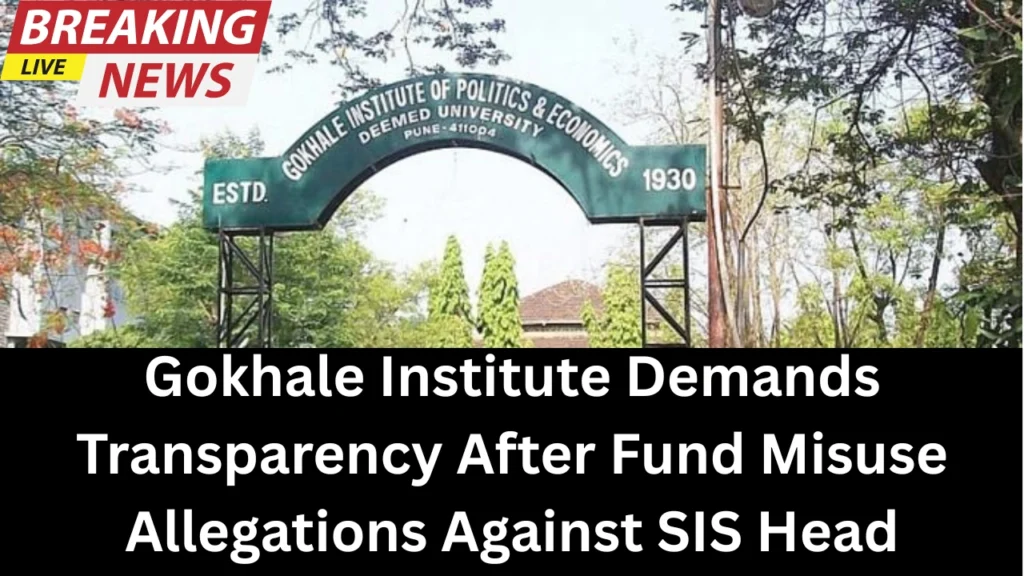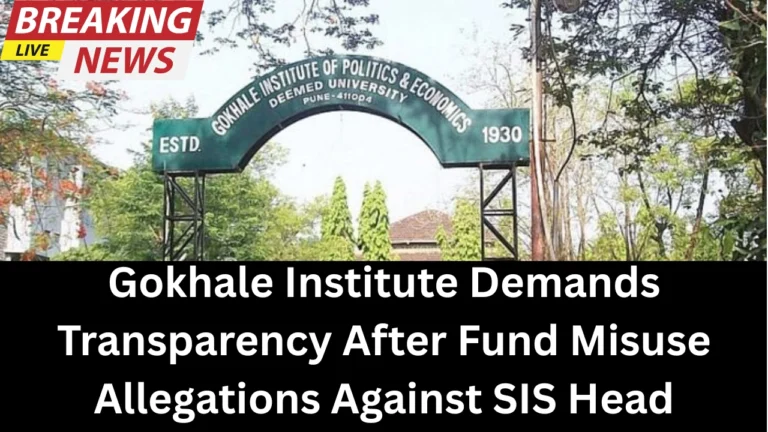The prestigious Gokhale Institute of Politics and Economics (GIPE) in Pune is at the center of a growing financial controversy that has raised serious concerns over governance and transparency. Allegations of misappropriation of funds, fraud, and unlawful appointments involving senior members of the Servants of India Society (SIS) which manages the institute have triggered a full-fledged investigation by the Pune City Police.

The scandal surfaced following an FIR filed by Dr. Vishal Gaikwad, the officiating Deputy Registrar of GIPE, leading to the arrest of SIS secretary Milind Bhagwant Deshmukh (52) on April 5. Deshmukh has been charged under various sections of the Indian Penal Code, including 406 (criminal breach of trust), 409 (criminal breach of trust by public servant, banker, merchant or agent), and 420 (cheating and dishonestly inducing delivery of property).
I had so far refrained from commenting on recent events at GIPE. However, I would like to put a few things on public record. SIS President Sahoo has raised two justifications for replacing me as Chancellor of GIPE. First, that I am somehow responsible for poor ‘B’ grade in NAAC… pic.twitter.com/4MSEmFhiyg
— Sanjeev Sanyal (@sanjeevsanyal) April 5, 2025
Allegations of Fund Misuse and Irregular Transfers
According to the FIR and police submissions, the alleged financial wrongdoing dates back to December 2022, when Deshmukh reportedly demanded ₹1.5 crore from GIPE to change the leasehold status of SIS-owned land in Nagpur to freehold.
Two days after the GIPE board gave in-principle approval, funds were distributed as follows:
- ₹1.02 crore transferred to the District Collector in Nagpur
- ₹40 lakh transferred to SIS by cheque
This entire process allegedly occurred without adhering to the University Grants Commission (UGC) guidelines, which prohibit transferring public-funded academic institution money to other entities.
Improper Use of Public and Student Funds
GIPE, established in 1930 and one of India’s oldest research institutions in economics and social sciences, primarily receives funding through:
- Grants from the Central Government
- Funds from the Maharashtra Government
- Support from UGC
- Tuition fees from students
As per UGC norms, such funds are meant exclusively for the academic and administrative needs of the institute, and cannot be reallocated without appropriate approvals. Yet, the complaint alleges that the money was used to settle legal costs in Deshmukh’s personal case, related to alleged cheating and forgery involving land owned by the Mahadev Govind Ranade Charitable Trust.
Trustees, Nepotism, and a Questionable Proposal
The investigation has revealed further irregularities. Police recorded statements from five trustees of SIS, which revealed that:
- No formal resolution was passed by SIS to request funds from GIPE
- The meeting in which the Nagpur land proposal was passed was held without quorum
- Relatives of three trustees were illegally appointed as “under training members” a day prior to the meeting
According to officials, these appointments are highly irregular and appear to have been made to influence the approval of the land deal.
Trustees whose statements have been recorded include:
- Gangadhar Narayan Sahu (66)
- Ramakant Vrundavan Leka (68)
- Dinesh Ramchandra Mishra (69)
- Amareshchandra Tripathi (76)
- Atmanand Mishra (76)
The remaining three trustees, whose relatives were allegedly inducted illegally, are under further scrutiny.
Deshmukh’s Arrest and Police Action
Milind Deshmukh was produced before a Pune court following his arrest. Police sought and were granted an extension of his custody until April 11 to facilitate additional interrogation and cross-examination with the other accused trustees.
As per supplementary statements recorded on April 8, additional instances of alleged misuse of GIPE funds have emerged:
- ₹10 lakh transferred from GIPE to SIS on March 1, 2024, reportedly used to pay legal fees in Deshmukh’s personal case
- Complaints about money transferred under pretexts such as lift maintenance, but allegedly misused
Document Trail and Financial Audit
Investigating officers from Deccan Police Station have secured:
- Audit reports of GIPE for FY 2021–2024
- Bank account details of both GIPE and SIS
- Minutes of board and trustee meetings
- Fund transfer records and letters issued by Deshmukh
This evidence is crucial to verify the chain of approval and to determine whether criminal collusion occurred among other institute officials, including the then vice chancellor, registrar, and accounts officer of GIPE.
Demand for Transparency and Institutional Integrity
The scandal has rocked GIPE, a legacy institution associated with Mahatma Gandhi’s Servants of India Society and known for its academic excellence in public policy and economics. In response, GIPE faculty and alumni have called for full transparency, an independent financial audit, and structural reforms in how SIS handles GIPE’s governance.
A senior faculty member, speaking on condition of anonymity, said:
“GIPE was built on the foundation of service and public integrity. These developments are a betrayal of that legacy. There must be transparency, and those found guilty must be held accountable.”
What’s Next?
With the investigation deepening, police are expected to:
- Cross-examine Deshmukh and the three remaining trustees
- Examine whether the entire GIPE board acted under coercion or misinformation
- Determine if other financial irregularities were hidden under regular operational expenses
- Investigate additional fund transfers masked as “service charges”
As of now, authorities have not ruled out further arrests or the possible suspension of administrative officials who were complicit in authorizing the unlawful transactions.
Conclusion
The unfolding scandal at the Gokhale Institute of Politics and Economics is not just about financial impropriety it’s about preserving the ethos of a public institution built on trust, service, and academic excellence. The allegations against Milind Deshmukh and the questionable role of SIS trustees have raised serious questions about the governance mechanisms at GIPE and similar public-private academic bodies.
As the police expand their probe and gather financial records, the demand for transparency, accountability, and reform continues to grow louder. What remains to be seen is whether this scandal will spark the overhaul of oversight structures or simply become another case of institutional betrayal lost in bureaucratic silence.

